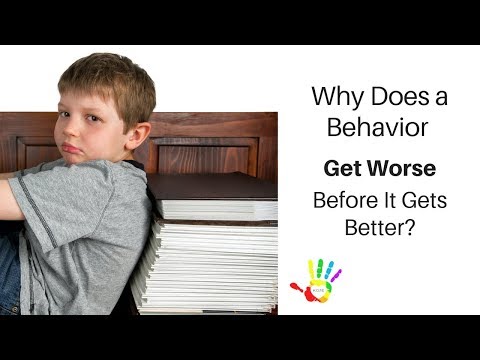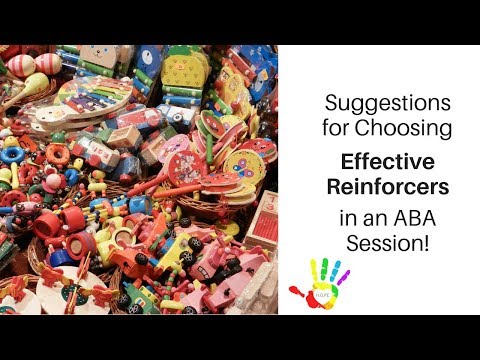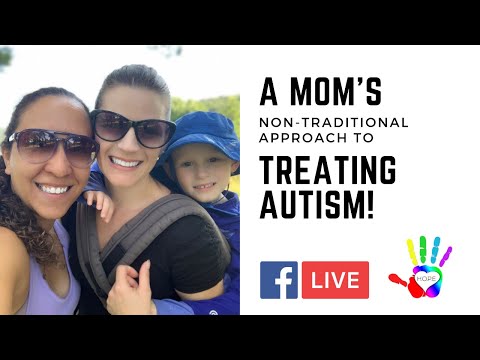Often times, shortly after starting a new behavior plan, a behavior can immediately getting much worse. Is this a cause for concern? Watch to find out!
A new video will be posted to this series weekly. Subscribe so you do not miss a video and send video requests or questions to Jessica@JessicaLeichtweisz.com
Credits:
Photo: Morguefile
Sound effect: Incomputek
Intro: Graeme Kan
Video Production: Highlander Productions
Disclaimer:
This video is intended for information purposes only. It is not intended to diagnose or treat any medical condition. The text, graphics, images, flash movies, and audio segments are not intended to be a substitute for professional medical advice, diagnosis, or treatment. Always seek the advice of your physician or other qualified health provider with any questions you may have regarding a medical condition.
The information contained in this segment is generalized. It may not be applicable in every situation. Before applying specific interventions, consult a behaviorist. Any behavior intervention can result in an undesired change in behavior if not implemented correctly. No client relationship is established as a result of watching these videos. Jessica Leichtweisz and Hope Education cannot be held responsible for any misuse of the information contained in these videos. <br> <h3>Auto Generated Captions</h3>
[Music]
hi and welcome back my name is Jessica
likewise founder and CEO of hope
education services every week I answer
questions sent in by other parents or
teachers about autism and ABA so tonight
the question I’m answering is what is an
extinction burst actually the question I
got is why is my child behavior getting
worse before it gets better
but the technical term for that is
called an extinction burst so when
you’re reducing a behavior oftentimes
extinctions use and by reducing I mean
you’re trying to get a child to stop
doing a behavior extinctions views and
what that means is you’re going to stop
reinforcing a behavior that previously
worked for the child so I’m going to
give an example let’s say that Nate
cries every time he wants a cookie
Nate can talk so he goes to the
refrigerator where the cookies are on
top of the refrigerator he sits at the
refrigerator and he starts crying
then mom says Oh Nate did you want a
cookie and he walks up to the
refrigerator and she gives me a cookie
well the Nate doesn’t have another way
of asking for cookie so crying is his
primary way of communicating he wants a
cookie and that’s been reinforced by
moms who gave him a cookie every time he
cries so now
Nate’s receiving ABA service services
and mom is saying look I won’t need to
stop crying all the time so the
therapist says okay well we’re going to
now put crying on extinction so anything
that previously worked Nate got by
crying we’re no longer going to give it
to him so in the past
crying works for getting a cookie but
now it’s on extinction so now we’re not
going to give Nate a cookie we’re not
going to reinforce the crying we’re not
going to give native cookie when he
cries so Nate goes up to the
refrigerator and he started crying and
mom completely ignores him she doesn’t
walk over and give him cookie
Nate’s confused because previously this
worked so Nate’s leg hmm
we’ll prize not going to work well what
else can I do
so now Nate cries but he throws himself
on the floor and he starts kicking the
refrigerator that’s also not working so
Nate starts getting really really angry
and you search the following things
around the kitchen he’s trying to get
mom’s attention he’s trying to let her
know mom I really really want a cookie
but none of the ways he got it in the
past the crying that he got it in the
past it’s no longer working so the
behavior is escalating
that’s called an extinction burst that’s
happened every single time you put a
behavior on extinction it’s when the
child figuring out okay well this old
way of asking for my cookie is not
working so what else do I need to do
that’s why it’s so important to be
teaching replacement behaviors which
we’ve made another video on when you’re
putting a behavior on extinction you’re
reducing a behavior but an extinction
burst will occur pretty much every time
so parents if your child just started
receiving a BA and it seems like the
behavior could be getting a little worse
unfortunately it probably will until it
does go away and the good news is
eventually Nate’s going to realize okay
you know what none of this crying
none of the screaming none of the
yelling none of the throwing is going to
get me a cookie I’m just not going to do
it anymore
and eventually the behavior will stop
and you won’t see it anymore so that’s
what we’re working towards and that’s
what we’re looking for but it may get
worse before it gets better so I hope
that answers your question then thank
you for the person who sent it in if you
have any other questions please email me
my emails Jessica Jessica likewise calm
I love to get your questions and I love
to answer them and help you if this is
your first time checking out our channel
please subscribe we post at least one
video per week and I look forward to see
helping you in the future and seeing you
comment and share our videos on our
YouTube channel and on Facebook until
next week
make it amazing week and I hope the
suggestion is help
[Music]
you
Why Does a Behavior get Worse Before it gets Better? bNOXMhhEV44
[Music]
hi and welcome back my name is Jessica
likewise founder and CEO of hope
education services every week I answer
questions sent in by other parents or
teachers about autism and ABA so tonight
the question I’m answering is what is an
extinction burst actually the question I
got is why is my child behavior getting
worse before it gets better
but the technical term for that is
called an extinction burst so when
you’re reducing a behavior oftentimes
extinctions use and by reducing I mean
you’re trying to get a child to stop
doing a behavior extinctions views and
what that means is you’re going to stop
reinforcing a behavior that previously
worked for the child so I’m going to
give an example let’s say that Nate
cries every time he wants a cookie
Nate can talk so he goes to the
refrigerator where the cookies are on
top of the refrigerator he sits at the
refrigerator and he starts crying
then mom says Oh Nate did you want a
cookie and he walks up to the
refrigerator and she gives me a cookie
well the Nate doesn’t have another way
of asking for cookie so crying is his
primary way of communicating he wants a
cookie and that’s been reinforced by
moms who gave him a cookie every time he
cries so now
Nate’s receiving ABA service services
and mom is saying look I won’t need to
stop crying all the time so the
therapist says okay well we’re going to
now put crying on extinction so anything
that previously worked Nate got by
crying we’re no longer going to give it
to him so in the past
crying works for getting a cookie but
now it’s on extinction so now we’re not
going to give Nate a cookie we’re not
going to reinforce the crying we’re not
going to give native cookie when he
cries so Nate goes up to the
refrigerator and he started crying and
mom completely ignores him she doesn’t
walk over and give him cookie
Nate’s confused because previously this
worked so Nate’s leg hmm
we’ll prize not going to work well what
else can I do
so now Nate cries but he throws himself
on the floor and he starts kicking the
refrigerator that’s also not working so
Nate starts getting really really angry
and you search the following things
around the kitchen he’s trying to get
mom’s attention he’s trying to let her
know mom I really really want a cookie
but none of the ways he got it in the
past the crying that he got it in the
past it’s no longer working so the
behavior is escalating
that’s called an extinction burst that’s
happened every single time you put a
behavior on extinction it’s when the
child figuring out okay well this old
way of asking for my cookie is not
working so what else do I need to do
that’s why it’s so important to be
teaching replacement behaviors which
we’ve made another video on when you’re
putting a behavior on extinction you’re
reducing a behavior but an extinction
burst will occur pretty much every time
so parents if your child just started
receiving a BA and it seems like the
behavior could be getting a little worse
unfortunately it probably will until it
does go away and the good news is
eventually Nate’s going to realize okay
you know what none of this crying
none of the screaming none of the
yelling none of the throwing is going to
get me a cookie I’m just not going to do
it anymore
and eventually the behavior will stop
and you won’t see it anymore so that’s
what we’re working towards and that’s
what we’re looking for but it may get
worse before it gets better so I hope
that answers your question then thank
you for the person who sent it in if you
have any other questions please email me
my emails Jessica Jessica likewise calm
I love to get your questions and I love
to answer them and help you if this is
your first time checking out our channel
please subscribe we post at least one
video per week and I look forward to see
helping you in the future and seeing you
comment and share our videos on our
YouTube channel and on Facebook until
next week
make it amazing week and I hope the
suggestion is help
[Music]
you
https://i.ytimg.com/vi/bNOXMhhEV44/hqdefault.jpg ABA,AUTISM,BEHAVIOR,BEHAVIOUR,APPLIED BEHAVIOR ANALYSIS,APPLIIED BEHAVIOUR ANALYSIS,EDUCATION,SPECIAL EDUCATION,HOPE EDUCATION SERVICES,EXTINCTION,EXTINCTION BURST,JESSICA LEICHTWEISZ Often times, shortly after starting a new behavior plan, a behavior can immediately getting much worse. Is this a cause for concern? Watch to find out!
A new video will be posted to this series weekly. Subscribe so you do not miss a video and send video requests or questions to Jessica@JessicaLeichtweisz.com
Credits:
Photo: Morguefile
Sound effect: Incomputek
Intro: Graeme Kan
Video Production: Highlander Productions
Disclaimer:
This video is intended for information purposes only. It is not intended to diagnose or treat any medical condition. The text, graphics, images, flash movies, and audio segments are not intended to be a substitute for professional medical advice, diagnosis, or treatment. Always seek the advice of your physician or other qualified health provider with any questions you may have regarding a medical condition.
The information contained in this segment is generalized. It may not be applicable in every situation. Before applying specific interventions, consult a behaviorist. Any behavior intervention can result in an undesired change in behavior if not implemented correctly. No client relationship is established as a result of watching these videos. Jessica Leichtweisz and Hope Education cannot be held responsible for any misuse of the information contained in these videos.



